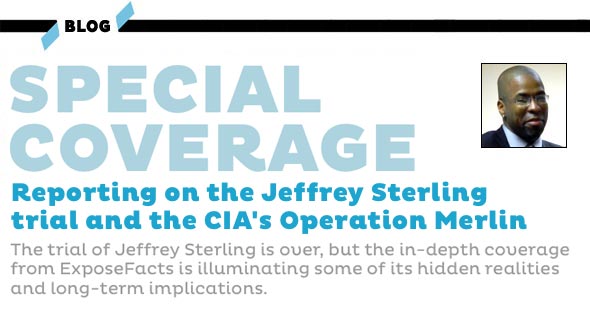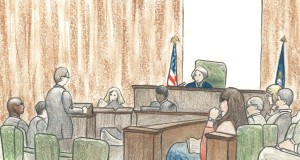The jury in the Jeffrey Sterling trial started deliberating on Thursday at around 2:30. Already, a day later, they’ve sent out 3 substantive questions (as well as the common request from juries for more Post-It notes).
A rough idea of those questions — and a rough idea of the instruction Judge Leonie Brinkema offered in response — are below (as well as an outline of the nine charges remaining after the judge dismissed the mail fraud charge the other day).
Question 1 (afternoon Thursday): What does venue mean for Count 10 (obstruction, which as charged took place while Sterling lived in Missouri)?
The obstruction has to have taken place in Eastern District of Virginia.
Question 2 (early Friday): What do “communicate directly and indirectly to James Risen” mean in Count 4?
In Count 4 only direct communication is at issue — for example, if I say something face-to-face, send a letter directly, or email directly to you.
Question 3 (late afternoon Friday): Does the document in Count 3 have to be stored in Sterling’s residence?
It is not an element of Count 3 that the letter at issue was in defendant’s residence. To find defendant guilty on Count 3, you must find defendant guilty beyond reasonable doubt that he committed the 2 elements on page 41 and proven venue in Eastern District of VA by a preponderance of the evidence. [Note, the instructions showing those elements have not yet been posted.]
Charges (see indictment):
One: Unauthorized disclosure of national defense information — by getting James Risen to publish a book about Merlin and Operation Merlin
Two: Unauthorized disclosure of national defense information — by sharing a letter Merlin sent to the Iranians with James Risen
Three: Unlawful retention of national defense information — by willfully retaining the letter Merlin sent to the Iranians
Four: Unauthorized disclosure of national defense information — by giving Risen the information on Merlin and Operation Merlin
Five: Unauthorized disclosure of national defense information — by giving Risen the letter Merlin sent to the Iranians
Six: Unauthorized disclosure of national defense information — by attempting to get Risen to publish an article on Merlin and Operation Merlin
Seven: Unauthorized disclosure of national defense information — by attempting to get Risen to writen a NYT story on the letter Merlin sent to the Iranians
Nine: Unauthorized conveyance of government property — by conveying classified information worth over $1,000 about Merlin and Operation Merlin to the public
Ten: Obstruction of justice — by deleting a March 10, 2003 email to James Risen with a link to a CNN article on Iran’s nukes sometime between April and July 2006, possibly after being subpoenaed in this case in June 2006 (Sterling was in Missouri at this point)


